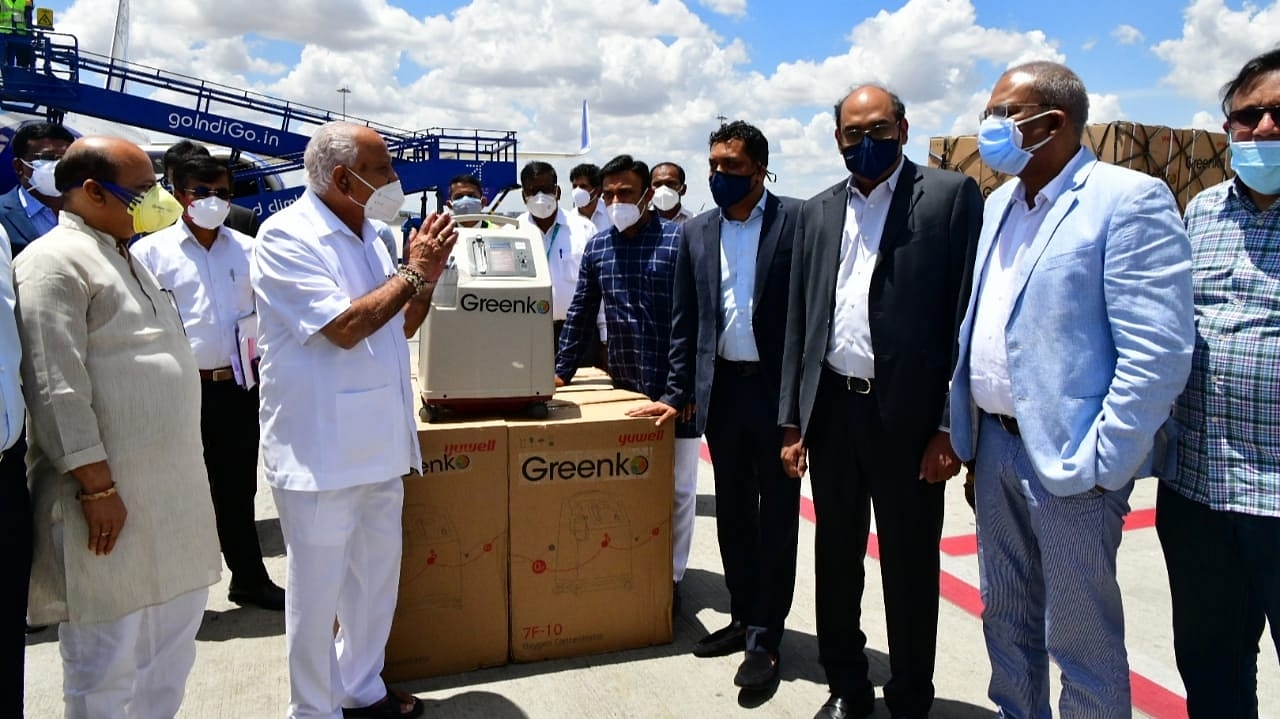Politics
How Collaboration And Not Competition Is The Need Of The Hour To Battle The Pandemic
- In the face of the 2020 pandemic, and the even more intense second wave of 2021, Karnataka is looking at partnerships as a vital lever in equipping healthcare institutions and masses with the tools needed in this war.
- Here's more.

Karnataka Chief Minister B S Yediyurappa with Green Co group founder Anil Chalamalashetty and Mahesh Kohli
At a time when polity is focussed on every aspect that keeps our people safe, whether that be beds or meds, ventilators or vaccines, it also behoves those of us selected to lead from the front, to focus on bringing players together, because as that cliched adage goes — together everyone achieves more.
The convergence of active partnerships, global collaborations, boundary-agnostic resources and more, will help humanity come through not just this pandemic, but prepare for a better future, a distant dream as it may seem, but what I firmly believe to be an inevitable reality.
World over, we are seeing polity and private players come together to ensure rapid, efficient and stable delivery of healthcare infrastructure and services. The aim is only one, and as someone with several years of policymaking experience, I can say that it is extremely heartening — the end game of improving the quality of care, life, and livelihood for (wo)mankind as a whole.
But why these partnerships and international assistance? Questions, legitimately so, can arise as to the government’s ability to manage or respond to a crisis. Given the uncertainty surrounding the pandemic, of course, there were initial hiccups.
I remember the late Sunil Jain, erstwhile Managing Editor of a leading pink paper and a great human being, once saying — it is our duty to question a government in peace, and to support them in crises.
There are several naysayers, for example, who have questioned why India has asked for help from other countries. To these very people I ask, when the State of Karnataka associated with private players, from biotech to start ups, from private healthcare to information technology, were questions raised? No.
We came together to solve problems, and hope to stay together, beyond them.
In the face of the 2020 pandemic, and the even more intense second wave of 2021, we are looking at partnerships as a vital lever in equipping healthcare institutions and masses with the tools needed in this war.
Keeping this in mind, we called upon the Global Innovation Alliance countries to partner with Karnataka in procuring of drugs of immediate need. We are also looking to partner with countries for new technologies such as nano medicine and artificial intelligence, to establish a better health monitoring system.
Looking closer, in October last year, Medical Education Minister for the State of Karnataka, Dr K Sudhakar, had spoken about measures to scale up Covid-19 tests and set up convenient diagnostic centres through the PPP model.
The Karnataka government even developed the software ‘Akanksha’ where companies could get the list of departments that they want to work with, under the ambit of corporate social responsibility.
When the first wave hit India last year, Karnataka was the first state to invoke the Epidemic Diseases Act of 1987. Since then, we have relied on the ‘5T’s to tackle the situation, leveraging Tracing, Testing, Tracking, Treatment, and Technology.
We were also quick to set up a Covid War Room in the city of Bengaluru, within a couple days to not only ensure timely and sufficient supply of oxygen, PPE kits, and medicines, but also a reliable source of information for any pandemic-related queries.
So that the state could be guided by evolving knowledge, science and evidence, a technical expert committee was also set up, composed of public and private health, virology and clinical experts.
When patients faced concerns about bed unavailability, we partnered with healthcare and IT players from the private sector to ensure not just more rooms and beds were made available, but also a portal for people to check availability in real-time, and from the safety of their homes.
Another innovative measure in partnership with the private sector was the setting-up of India’s first-ever Covid-19 Modular ICU units, replete with all the facilities of a modern hospital including remote telemedicine.
And this isn’t the ‘Karnataka model’, or whatever one may choose to call it. It is the PPP model, the Partnership-Partnership-Partnership model, the Public-Private Partnership model, the People-People-People model.
When in need, the important thing is not to get carried away by the who, but focus on the how. The former speaks to finding someone to blame; the latter, to resolving the crisis at hand.
Many of us have shown tenacity in tribulation, finding solutions that may sustain beyond the current crisis, to the next. Coming together to find innovative answers will be crucial, as they may as well lay a robust foundation for the next health crisis’ social contract — one that is made stronger by a combination of polity, sustainability, and ethics.
Introducing ElectionsHQ + 50 Ground Reports Project
The 2024 elections might seem easy to guess, but there are some important questions that shouldn't be missed.
Do freebies still sway voters? Do people prioritise infrastructure when voting? How will Punjab vote?
The answers to these questions provide great insights into where we, as a country, are headed in the years to come.
Swarajya is starting a project with an aim to do 50 solid ground stories and a smart commentary service on WhatsApp, a one-of-a-kind. We'd love your support during this election season.
Click below to contribute.
Latest